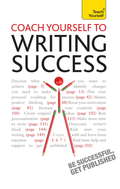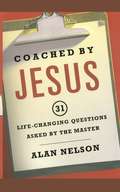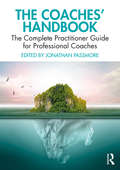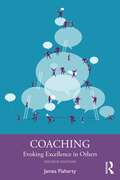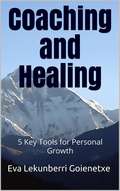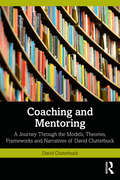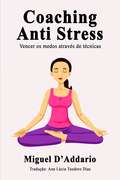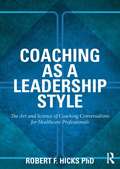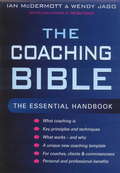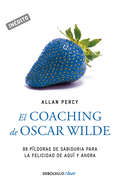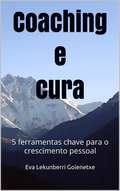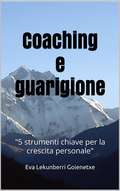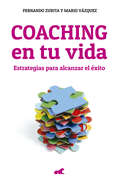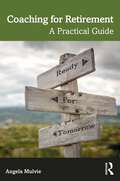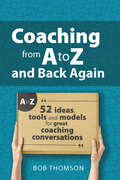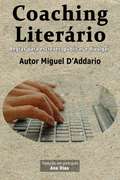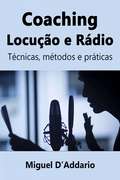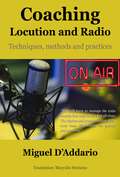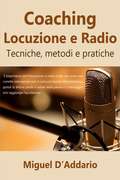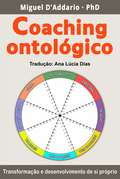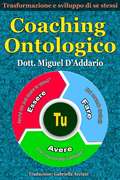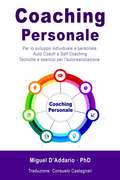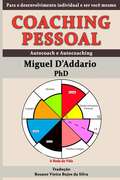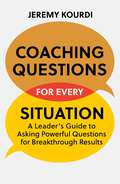- Table View
- List View
Coach Yourself to Writing Success: Boost Motivation, Increase Creativity and Achieve Your Writing Goals
by Bekki HillYou know how to woo publishers. You know how to write. But do you know how to overcome the things that prevent you being published? This book is the first personal coach for writers. If you write, whether professionally, for fun, or with dreams of doing both, it will help you to change your relationship with your writing, to be more motivated, to be more creative, less challenged and, ultimately, to be more successful. It will help you create strong strategies to ensure you succeed and will address such timeless writing challenges as writers' block, lack of time and even rejection.
Coached by Jesus
by Alan NelsonRecent years have seen the rise of life coaches as a popular approach to personal growth. While a counselor might provide in-depth analysis, a life coach encourages the client to do the practical, productive work of grappling for answers to life's most important questions. No one was more skilled at asking profound questions than Jesus. His questions challenged wrong thinking, penetrated the heart, and provided a catalyst for true change. Alan Nelson, Ed. D. presents thirty-one questions asked by Jesus, amplifies their meaning to clearly connect with the contemporary reader, and offers an application section to translate new thinking into new ways of living. Excellent for personal study as well as small group discussion, it capitalizes on a growing trend embraced by adults of all ages.
The Coaches' Handbook: The Complete Practitioner Guide for Professional Coaches (Wiley-blackwell Handbooks In Organizational Psychology Ser.)
by Jonathan PassmoreThis comprehensive practitioner guide provides an accessible evidenced based approach aimed at those new to coaching and who may be undertaking coach training for a certificate in coaching or professional credentials or accreditation with the AC, ICF, EMCC, CMI or ILM. The book will also be useful for those who want to enhance their coaching skills. The Coaches Handbook is edited by Jonathan Passmore, an internationally respected expert and executive coach, with chapters from leading coaching practitioners from across the world. The book is divided into seven sections. Section one examines the nature of coaching, its boundaries, the business case for coaching and how organisations can build a coaching culture. Section two focuses on deepening our self-understanding and understanding our clients, the non-violent communications mindset and the coaching relationship. Section three focuses on the key skills needed for coaching including goal setting, powerful questions, active listening, using direct communications and the role of silence, emotions and challenge in coaching. Section four offers a range of coaching approaches including behavioural, person-centred, solution-focused, psychodynamic, neuroscience, narrative, positive psychology, out-door eco-coaching, team coaching, careers coaching and integrated coaching. Section five focuses on fundamental issues in coaching such as ethics and contracting and evaluation. Section six explores continuous professional development, reflection and the role of supervision, as well as how to establish your coaching business. The final section contains a host of coaching tools which practitioners can use to broaden their practice. Unique in its scope, this key text will be essential reading for coaches, academics and students of coaching. It is an important text for anyone seeking to understand the best practice approaches that can be applied to their coaching practice, including human resources, learning and development and management professionals, and executives in a coaching role.
Coaching: Evoking Excellence in Others
by James FlahertyNow in its fourth edition, the bestselling, seminal book by James Flaherty, Coaching: Evoking Excellence in Others, is an insightful, thought-provoking, pragmatic guide that dissects the art and science of coaching. This fourth edition includes two brand new chapters: the first is on finding one’s inner guidance and purpose in traversing the world of work, especially in more uncertain working environments; and the second is on the topic of somatic intelligence. As in earlier editions, this foundational book in coaching clearly presents the theories, concepts, and models, and then moves on to consider rigorous methods of practice and self-observation in a relationship of mutual trust, respect, and freedom of expression. It will probe you to rethink how you relate to your clients and your staff, how you produce long-term excellent performance in yourself, and how you can become more effective in helping others to achieve their goals. Coaching, Fourth Edition is a rich learning resource guide for new and experienced coaches who want to challenge their methods of partnering with clients. It is also an inspiring guide for training managers and leaders, human resource development managers, and general managers who want to develop their teams.
Coaching and Healing
by Eva Lekunberri GoienetxeA journey through holistic coaching and nature, offering key tools for personal growth. Based on its author's experience, the book takes us into the world of self-knowledge, connecting with nature and achieving wellbeing in order to live our lives to the fullest.
Coaching and Mentoring: A Journey Through the Models, Theories, Frameworks and Narratives of David Clutterbuck
by David ClutterbuckThis book represents both a milestone and a celebration. It brings together in one place all the theories and models that have emerged from the work of David Clutterbuck, one of the last surviving, first pioneers of coaching and mentoring, who has significantly helped to shape the field; and is published as his 75th book at age 75. Many of the models and approaches familiar to coaches and mentors are based in David’s prolific research, writing and practice, from Systemic Talent Management, through Team Coaching from a Complex, Adaptive Systems perspective, Personal Reflective Space, to the Diversity Awareness Ladder. In bringing more than 60 of these innovations into one volume, the book provides an invaluable contribution to the practice of coaching, and puts the evolution of coaching theory into context, tracing its development over time. This book is a one-stop-shop for coach practitioners and students to get up to speed and understand these foundational models. This book will appeal to coaches and HR professionals across the world, at all levels.
Coaching Anti Stress: Vencer o medo através de técnicas
by Miguel D'AddarioO medo é uma emoção caraterística de todos os seres humanos, que muitas vezes vemos como um sentimento e que não sabemos porque é que o sentimos, mas entretanto não sabemos que é um estado do cérebro ou sistema neuro endócrino, que surge em determinadas condições e se manifesta de determinadas formas de comportamento.
Coaching as a Leadership Style: The Art and Science of Coaching Conversations for Healthcare Professionals
by Robert F. Hicks, PhD.The healthcare environment is in flux. On the one hand, doctors are being driven into ever larger group practices by increasing regulatory and administrative burdens and the need for greater negotiating power. At the same time, growing infrastructure costs and the threat of payment reform is pushing them into closer alignment with hospital systems. This rapidly changing environment requires a more sophisticated set of leadership skills. This book introduces a unique and practical coaching style as a way of interacting with colleagues, managing direct-reports, helping others solve problems, responding to change, making effective choices and developing professionally. It draws from four evidence-based models for interacting with others and facilitating change - solution-focused therapy, cognitive-behavioral therapy, motivational interviewing, and transactional analysis – and reframes them so that they are congruent with managerial and leadership terminology and provide a practical set of methods and tools for today’s healthcare leader.
The Coaching Bible: The Essential Handbook
by Wendy Jago Ian McDermottThe Coaching Bible is a practical and inspiring new book from the UK's top coaches Ian McDermott and Wendy Jago, authors of The NLP Coach and Your Inner Coach. Coaching has become an integral part of our lives, but people still need to know how to make the most of what coaching can offer. The Coaching Bible is the only book on coaching that you need. It offers unique, valuable and expert advice to help you if: You are thinking about getting a coach to help you become more effective; You commission coaching to develop other people; You are considering becoming a coach yourself; You are already a coach and want to extend your knowledge and your skills; You want to learn how to adopt a coaching approach to your own life. This is a comprehensive and authoritative guide to the key principles and techniques that make coaching one of the most powerful and exciting tools for furthering personal and professional effectiveness. It explains what works and why and includes a new coaching model to benefit everyone.
The Coaching Bible: The essential handbook
by Ian McDermott Wendy JagoCoaching has become an integral part of our lives, but people still need to know how to make the most of what coaching can offer. The Coaching Bible is the only book on coaching that you need. It offers unique, valuable and expert advice to help you if: You are thinking about getting a coach to help you become more effective; You commission coaching to develop other people; You are considering becoming a coach yourself; You are already a coach and want to extend your knowledge and your skills; You want to learn how to adopt a coaching approach to your own life. This is a comprehensive and authoritative guide to the key principles and techniques that make coaching one of the most powerful and exciting tools for furthering personal and professional effectiveness. It explains what works and why and includes a new coaching model to benefit everyone.
El coaching de Oscar Wilde: 99 píldoras de sabiduría para la felicidad de aquí y ahora (Genios para la vida cotidiana #Volumen)
by Allan PercyEn El coaching de Oscar Wilde, de la serie «Genios para la vida cotidiana», el prestigioso Allan Percy reúne 99 aforismos del escritor y nos guía en su puesta en práctica para alcanzar una vida plena y feliz. Además de un brillante escritor, dramaturgo y polemista, Oscar Wilde está considerado el mejor autor de aforismos de la historia moderna. Sus célebres pensamientos de una sola frase son ingeniosos y profundos. El autor de Nietzsche para estresados toma 99 perlas de sabiduría de quien, justamente por su vida centrada en los placeres, conoció todos los extremos del alma humana, y traslada sus mensajes a situaciones actuales para enseñarnos a sortear los problemas y gozar de la vida sorbo a sorbo.
Coaching e cura
by Eva Lekunberri VatellaUm passeio através do coaching holístico e a natureza, oferecendo ferramentas fundamentais para o crescimento pessoal. Baseado na experência da autora, nos faz mergulhar no mundo do auto-conhecimento, da conexão com a natureza e o alcance do bem-estar para viver mais plenamente.
Coaching e guarigione: 5 strumenti chiave per la crescita personale
by Eva Lekunberri GoienetxeUn viaggio attraverso il coaching olistico e la natura che ci offre strumenti chiave per la crescita personale. Basato sull'esperienza dell'autrice, ci coinvolge nel mondo dell'autocoscienza, della connesione con la natura e del raggiungimento del benessere per vivere la vita in modo più completo.
Coaching en tu vida: Estrategias para alcanzar el éxito
by Fernando Zurita Mario Vázquez¿Dónde te encuentras hoy?, ¿estás en el lugar que hace cinco años te imaginabas? El coaching es una herramienta que nos ayuda a clarificar lo que queremos hacer en la vida, a cumplir con nuestras metas y objetivos de la manera más asertiva posible. Fernando Zurita y Mario Vázquez ambos certificados por la Fundación Mexicana para la Innovación Gubernamental y Empresarial (Fundinnova) desarrollaron este enfoque de coaching que se basa tanto en el ámbito empresarial como personal, en donde es importante tener una visualización de lo que deseamos que llegue a nosotros así como una alta autoestima, conocimientos del manejo del tiempo, de la resiliencia y, lo más importante, cómo romper nuestros malos hábitos que, a fin de cuentas, terminarán por sabotear los propósitos. Aquí se dan los instrumentos necesarios para alcanzar el éxito en distintas áreas: el trabajo, la familia, nuestros proyectos de vida y relaciones sociales. El coach no juzga a su cliente, lo acompaña en la búsqueda de su camino. Se trata de un proceso de aprendizaje y crecimiento que lo apoya a tomar consciencia y asumir responsabilidad en la creación de su futuro. Distintas personas han recurrido al coaching para mejorar sus vidas como Bill Clinton, Oprah Winfrey, la Princesa Diana, la Madre Teresa de Calcuta, Nelson Mandela, Anthony Hopkins, Hugh Jackman y Leonardo DiCaprio, entre otros.
Coaching for Retirement: A Practical Guide
by Angela MulvieRetirement is a time of both challenge and opportunity, which can be a daunting prospect. This highly practical book, written for coaches and HR professionals who are supporting others through the process, shows what can be done to help people towards a successful change in their lives and circumstances as they move towards post-employment. Coaching for Retirement explores how to coach people towards sound planning for and management of retirement, from both an employer and employee perspective. The book considers how coaching has evolved to include retirement coaching as a growing specialism, and how retirement itself is changing because of a range of social, economic and political factors, both in the UK and globally. As a recent retiree herself, as well as an experienced coach, Angela Mulvie provides useful and interesting insights into the factors impacting how people plan and prepare for this next stage, answering key questions such as: How can the pre-retirement needs of staff be determined? How might retirement coaching support the decision-making processes involved? What options might individuals consider, e.g. part-time work, volunteering, pursuit of a second/portfolio career, new learning opportunities, etc.? What financial implications do people need to explore and how can these be prioritized? How can emotional aspects of retirement – health, wellbeing and relationships – be supported? What tools are available to support people in planning their retirement? As organizations are increasingly recognizing the importance of providing support to employees at all stages of their careers, this is an essential resource for coaches, HR professionals and all professionals involved in retirement planning.
Coaching from A to Z and back again: 52 Ideas, tools and models for great coaching conversations
by Bob ThomsonWritten by an experienced coach, mentor and mediator, this book is perfect for developing your coaching skills by drawing on ideas, tools and models to help you engage in effective coaching conversations.It takes ideas from a variety of approaches to coaching and explores issues such as ethics, coaching as a line manager, boundaries and qualifications/accreditation. It summarises key ideas from the literature on management, leadership, psychology and personal effectiveness, as well as coaching.Written in 52 short accessible chapters from A to Z and back again, it is a clear and engaging guide that can be read from beginning to end, or dipped in to as appropriate. Critical questions throughout help the reader to reflect on their own knowledge and apply it to their work or studies. This book is ideal for students on coaching programmes, people working as a coach, consultants, learning and development practitioners, and managers at all levels from supervisor to director.
Coaching literario
by Miguel D'AddarioEscrever é uma vocação, que nasce de uma necessidade própria em cada pessoa. É uma manifestação interior, uma expressão de comunicação, seja ela artística, científica, ou de outro género literário.É uma caraterística do ser humano, a comunicação através da escrita. O que significa que cada um o fará à sua maneira e da sua forma, do mesmo modo que cada leitor irá interpretar o conteúdo de um livro, uma revista, ou outro formato, de forma diferente, ao compreender segundo as suas próprias capacidades e conhecimentos. San Buenaventura de Bagnoregio, escreveu no século XIII, que existiam quatro formas de produzir um livro: 1. Sendo um Escriba (Scriptor): Pessoa que escreve obras de outros autores, sem adicionar, modificar ou retirar qualquer conteúdo do texto original. 2. Sendo um Compilador (Compilator): Pessoa que escreve obras de outros autores com adições que não são da sua autoria (também de outros autores) 3. Sendo um Comentador (Comentator): Pessoa que escreve obras suas e de outros autores, atribuindo o papel principal às obras de outros autores com adições que sirvam de esclarecimento. 4. Sendo um Autor (Auctor): Pessoa que escreve as próprias obras e as de outros autores, atribuindo o papel principal aos seus textos e adicionando textos de outros autores para embelezar a sua obra. Por isso, uma pessoa que escreve é, definitivamente, um Autor, independentemente de ter obra publicada ou não. E a diferença reside no caráter legal que a sociedade administra através da identificação de cada obra, o ISBN. Esse número constitui o caráter legal de uma publicação, e insere o trabalho nas bases bibliográficas internacionais, é o Documento de Identificação de cada livro.
Coaching Locução e Rádio: Técnicas, métodos e práticas
by Miguel D'AddarioPartindo da ideia de guião como caminho ou esquema para o orador desenvolver com ordem e segurança a difusão da sua mensagem, é importante referir como deve estar balizado tal discurso,(sempre balizado pelo próprio orador) para recordar e ver aspectos do discurso com apenas um único olhar.
Coaching Locution and Radio
by Miguel D'AddarioCoaching: Consists of the guidance that an external professional (coach) gives to a manager to improve their skills, that is, make them much more effective in their performance. The importance of the speaker in the radio communication is definitive, and his verbal, fundamental self-confidence. His job is to seduce the listener by helping his personality and his ability to communicate. You must get the attention of the listener and, above all, their trust. Your VOICE in this sense plays a fundamental and outstanding role.
Coaching Locuzione e Radio: Tecniche, metodi e pratiche
by Miguel D'AddarioComunicare è fare sapere all’altro cosa pensi, senti o desideri. Il modo più comune è comunicare parlando. Il potere della comunicazione in radio è molto grande e la parola in ogni momento suggerisce, stimola l'immaginazione, provoca la creazione di immagini; inoltre combatte la malattia della solitudine. La radio, attraverso la voce dell'oratore, svolge un ruolo di accompagnamento; l'ascoltatore si identifica con l'annunciatore che lo tiene piacevolmente impegnato durante le attività di routine.Comunicare è fare sapere all’altro cosa pensi, senti o desideri. Il modo più comune è comunicare parlando. Il potere della comunicazione in radio è molto grande e la parola in ogni momento suggerisce, stimola l'immaginazione, provoca la creazione di immagini; inoltre combatte la malattia della solitudine. La radio, attraverso la voce dell'oratore, svolge un ruolo di accompagnamento; l'ascoltatore si identifica con l'annunciatore che lo tiene piacevolmente impegnato durante le attività di routine.
Coaching Ontológico
by Miguel D'AddarioO Coaching ontológico é um paradigma diferente, um contexto distinto para que os objetivos sejam atingidos, seja no âmbito pessoal ou num trabalho em equipa. O Coach ontológico não diz aos formandos aquilo que devem fazer, não pressiona, não aconselha, nem recomenda, simplesmente explora, faz perguntas, apresenta interpretações genéricas, além disso, desafia com respeito os seus modelos mentais para desenvolver uma nova perspetiva que permita a descoberta de novas ações e possibilidades; e acompanha o desenvolvimento de ações que permitam o acesso aos resultados pretendidos.
Coaching ontologico
by Miguel D'AddarioIl Coaching si fonda, principalmente, sul metodo socratico, la maieutica, la quale afferma che ogni essere umano ha la risposta dentro di sé e che l’apprendimento è una scoperta. Il coaching, come stile di allenamento nello sport, nacque a metà degli anni 70, grazie a Timothy Gallwey, allenatore sportivo e maestro di tennis presso l’università di Harvard. Gallwey affermava che l’avversario più temibile per un tennista stava sempre dal suo lato della rete. Il Coaching è un sistema di comunicazione positiva ed effettiva che insegna a domandare, ascoltare, rispondere, prendere coscienza e stabilire un piano d’azione con delle aspettative nuove e migliori. Il coach ontologico non dice alle persone quello che devono fare, non fa loro pressioni, né le consiglia o le raccomanda, bensì esplora, pone domande, offre interpretazioni produttive, sfida rispettosamente i loro schemi mentali affinché sviluppino un nuovo modo di vedere che permetta di scoprire nuove azioni e possibilità; li accompagna nella progettazione di azioni che facilitino loro il raggiungimento dei risultati cercati. . Il Coaching ontologico è una dinamica di trasformazione attraverso la quale le persone e le organizzazioni rivedono, sviluppano ed ottimizzano i loro modi di stare al mondo. Si presenta come un dialogo che crea una nuova cultura e non come una tecnica interna alla cultura. Il Coaching ontologico è un processo fondamentalmente liberatorio di sofferenze e convinzioni. Ci connette con le nostre risorse e la nostra capacità di intervento, ottenendo un maggiore benessere ed efficacia nel raggiungimento dei risultati che ci interessano. Nel processo di Coaching ontologico la crescita avviene nel dominio del Sé, attraverso un processo di apprendimento che mette in discussione, rispettosamente, i modi tradizionali di percepire ed interpretare, dove le persone e i gruppi interrompono i loro abituali modelli di condotta e comportamento. Il Coaching ontologico sv
Coaching Personale
by Miguel D'Addario<P><P>COACHING PERSONALE <P>Per lo sviluppo individuale e personale <P>Auto Coach e Self Coaching <P>Tecniche e esercizi <P>Coach è un termine che significa: allenatore in inglese. Carro che porta da un luogo a un altro, in francese e metodo d’insegnamento applicato per Socrate, “Maieutica”, in greco. Il Coaching Personale o Life lavora sugli obiettivi personali, cioè della vita propria delle persone. Sviluppa il potenziale di queste partendo dai propri obiettivi personali. Considerando che ogni individuo è differente, sia per gli obiettivi sia per la sua personalità, il Coaching Personale dev'essere dinamico e adattativo Soprattutto incide nell'ESSERE y nel FARE per il raggiungimento dello sviluppo personale. Miguel D'Addario, Coach professionista, docente specializzato, sociologo, comunicatore, autore di libri e professore; plasma in questo volume le tecniche e esercizi per essere un Auto Coach y applicare il Self Coaching, mediante l'autoconoscenza, l'auto motivazione, la autorealizzazione, con il fine di ottenere gli obiettivi personali. Analizza, nella prima parte del libro, cos’è il Coaching?, visto come un fenomeno sociale che viene a ridirezionare i parametri individuali. Tenendo conto dei tipi di Coaching esistenti, e le abilità che dovrà avere un Coach di fronte al Coachee Esamina i processi di allenamento al fine di apprendere i metodi e le tecniche per essere un Auto Coach Personale. Nella seconda parte del libro studia l'applicazione dell'Assertività e la Programmazione Neurolinguistica, sviluppando metodologie e servizi pratici per lo sviluppo delle Abilità Sociali. Questo utilizzando esercizi di respirazione e autocontrollo emozionale. Nella parte finale, ci mostra i processi per essere un Auto Coach e Self Coaching, attraverso domande potenti esercizi pratici, come La Ruota della Vita che aiuta a scoprire la posizione attuale e reale di ogni sfaccettatura della vita e paragonarla
Coaching Pessoal
by Miguel D'AddarioCoach é um termo que significa: Treinador, em inglês. Carro que transporta alguém de um lugar para outro, em francês. E método de ensino aplicado por Sócrates, “Maiêutica”, em grego. O Coaching Pessoal ou Life, trabalha nos objetivos pessoais, ou seja, própria vida das pessoas. Desenvolve o potencial destas partindo de seus próprios objetivos pessoais. Considerando que cada indivíduo é diferente, tanto seus objetivos como sua personalidade, o Coaching Pessoal será dinâmico e adaptativo. Sobre tudo, atua sobre o SER e o FAZER para o alcance do desenvolvimento pessoal. Miguel D´Addario, Coach profissional, especialista em docência, sociólogo, comunicador, autor de livros e professor; verte neste volume as técnicas e exercícios para ser um Autocoach e aplicar o Autocoaching, mediante o autoconhecimento, a automotivação, a autorrealização, com o fim de alcançar os seus objetivos pessoais.
Coaching Questions for Every Situation
by Jeremy KourdiPowerful coaching questions to get the best out of any situation.In coaching, questions are the route to progress. Questions enable the people being coached to arrive at their own solutions and, crucially, to 'own' them as well. The effectiveness of this tool applies to anyone in a coaching role, whether as a leader, a professional coach, or a people management executive. A good question, asked at the right moment, can be transformative. Great questions allow coaches to influence, develop and shape someone's thinking far beyond that of their own knowledge or area of expertise, propelling the learner to new levels of insight, awareness, action and effectiveness. Coaching Questions for Every Situation delivers bags of context-specific questions to leaders and coaches right when they need them most, equipping them with the essential tools to deal with a difficult situation, raise performance or offer a moment of motivation. It includes sections on both virtual coaching and coaching across cultures.The book explains the guiding principles behind great questions as well as the pitfalls to avoid, serving as a practical guide to becoming a highly effective questioner.
